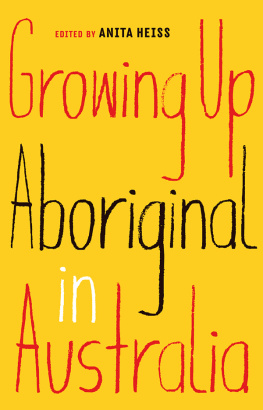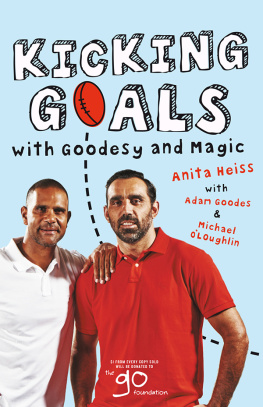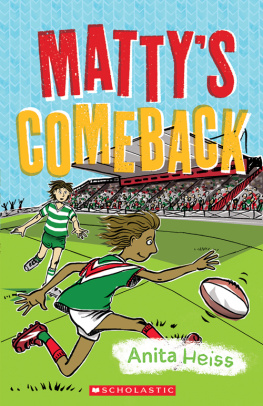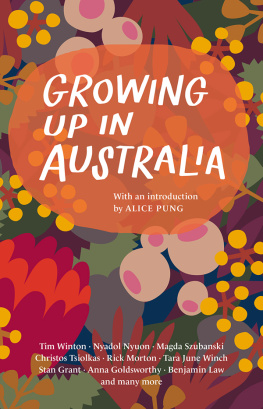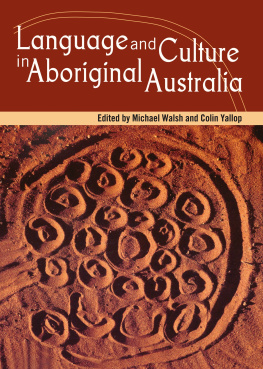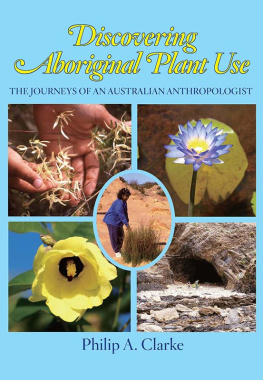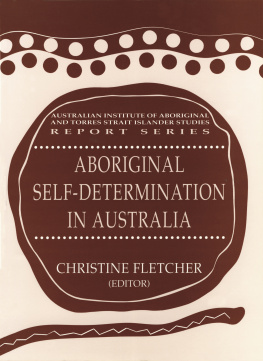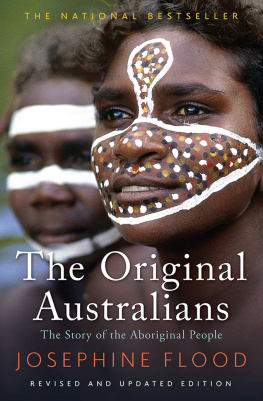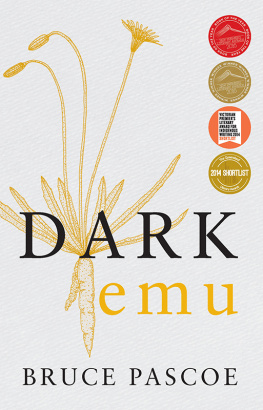Anita Heiss - Growing Up Aboriginal in Australia
Here you can read online Anita Heiss - Growing Up Aboriginal in Australia full text of the book (entire story) in english for free. Download pdf and epub, get meaning, cover and reviews about this ebook. year: 2018, publisher: Black Inc., genre: Non-fiction / History. Description of the work, (preface) as well as reviews are available. Best literature library LitArk.com created for fans of good reading and offers a wide selection of genres:
Romance novel
Science fiction
Adventure
Detective
Science
History
Home and family
Prose
Art
Politics
Computer
Non-fiction
Religion
Business
Children
Humor
Choose a favorite category and find really read worthwhile books. Enjoy immersion in the world of imagination, feel the emotions of the characters or learn something new for yourself, make an fascinating discovery.
- Book:Growing Up Aboriginal in Australia
- Author:
- Publisher:Black Inc.
- Genre:
- Year:2018
- Rating:4 / 5
- Favourites:Add to favourites
- Your mark:
- 80
- 1
- 2
- 3
- 4
- 5
Growing Up Aboriginal in Australia: summary, description and annotation
We offer to read an annotation, description, summary or preface (depends on what the author of the book "Growing Up Aboriginal in Australia" wrote himself). If you haven't found the necessary information about the book — write in the comments, we will try to find it.
Growing Up Aboriginal in Australia — read online for free the complete book (whole text) full work
Below is the text of the book, divided by pages. System saving the place of the last page read, allows you to conveniently read the book "Growing Up Aboriginal in Australia" online for free, without having to search again every time where you left off. Put a bookmark, and you can go to the page where you finished reading at any time.
Font size:
Interval:
Bookmark:
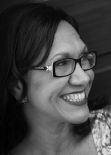
DR ANITA HEISS is the author of non-fiction, historical fiction, commercial womens fiction, poetry, social commentary and travel articles. Her books include Tiddas, Am I Black Enough for You? and Barbed Wire and Cherry Blossoms. She is a regular guest at writers festivals and travels internationally performing her work and lecturing on Aboriginal literature. She is a proud member of the Wiradjuri nation of central NSW, a Lifetime Ambassador of the Indigenous Literacy Foundation and manages the Epic Good Foundation. Anita was a finalist in the 2012 Human Rights Awards and the 2013 Australian of the Year Awards.

Published by Black Inc.,
an imprint of Schwartz Publishing Pty Ltd
Level 1, 221 Drummond Street
Carlton VIC 3053, Australia
www.blackincbooks.com
Introduction and selection Anita Heiss and Black Inc. 2018
Anita Heiss asserts her moral rights in the collection.
Individual stories retained by the authors, who assert their rights to be known as the author of their work.
ALL RIGHTS RESERVED.
No part of this publication may be reproduced, stored in a retrieval system, or transmitted in any form by any means electronic, mechanical, photocopying, recording or otherwise without the prior consent of the publishers.
9781863959810 (paperback)
9781743820421 (ebook)

Cover, text design and typesetting by Tristan Main
In memory of Alice Eather (19882017) and so many others who were lost too soon
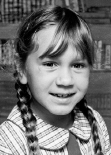
Introduction
Anita Heiss
There is no single or simple way to define what it means to grow up Aboriginal in Australia, but this anthology is an attempt to showcase as many of the diverse voices, experiences and stories together as possible.
We received more than 120 original submissions from Aboriginal people nationally as a result of the callout for contributions, each with an important story to tell, proving that many want mainstream Australia to understand what its like to grow up Aboriginal.
Each account reveals, to some degree, the impacts of invasion and colonisation on language, on country, on ways of life, on how people are treated daily in the community, the education system, the workplace and in friendship groups.
The stories cover country from Nukunu to Noongar, Wiradjuri to Western Arrernte, Ku Ku Yalinji to Kunibdji, Gunditjamara to Gumbaynggirr and many places in between.
Experiences span coastal and desert regions, cities and remote communities, and all of them speak to the heart sometimes calling for empathy, oftentimes challenging stereotypes, always demanding respect.
We did not place any boundaries on the collection, other than that the pieces had to be non-fiction and so we have life stories written from all around the country, including from boarding schools and even from inside prison; and from schoolchildren, university students and grandparents. We also have recollections of growing up Aboriginal in Australia by opera singers, actors, journalists, academics and activists. In many ways, this anthology will also serve to demonstrate how we contribute to, and participate in, many varied aspects of society every day.
While lives have been lived and expressed individually, there are numerous communal connections and shared experiences that frame common themes, including the importance and influence of identity, the stolen generations, family and kinship, education, concepts of country and place, and sport.
This collection mirrors the society that Aboriginal people live in and engage with every day, so there are motivational and uplifting stories alongside those on suicide; words on feminism and sexuality, as well as football and theatre. Role models and religion and road trips. We are diverse peoples and thats exactly what growing up Aboriginal means today in Australia.
Many contributors are being published for the first time. All have generously and courageously bared their personal and family histories, their pain and heartache, their experiences of racism so that others can learn about what it means to grow up as a First Nations person in a country where they are often viewed and treated as second-class citizens, and sometimes even worse than that.
But this anthology is not one of victimhood: it is one of strength and resilience, of pride and inspiration, demonstrating the will to survive and the capacity to thrive against the odds. Growing Up Aboriginal in Australia paints a landscape of a country that has created leaders who form strong communities, with a generous heart and passion for change. That is why this anthology matters. The goal is to break down stereotypes many of which are identified within these pages and to create a new dialogue with and about Aboriginal Australians.
There are over fifty contributors to this collection. One deserves special mention, not only for her work as a poet and community role model, but because during the process of compiling this book she took her own life at the age of twenty-eight. Alice Eather was a devoted and passionate bilingual primary school teacher, and in recent years she was widely recognised for her performance poetry, her work as an activist, and a dynamic member of her community. Alice had an unswerving commitment to sustaining her language, people and homeland. Alices family and all those involved in the production of the anthology hope her work and messages will remain as a legacy to inspire others.
Reading through the submissions for Growing Up Aboriginal in Australia, I saw elements of myself as a child and as an adult, still on a journey of learning and discovery. I felt the same sting of racism as described by some contributors, as well as the strength and resilience expressed by others. I was fortunate as a child growing up Aboriginal in Australia: although I wasnt surrounded by my extended Wiradjuri family in the Sydney suburb of Matraville, my close-knit immediate family provided all the support, guidance and the protection I sometimes needed to become a strong, proud, urban Koori who knows how to assert her rightful place in this country, and the world. Heres hoping this collection proves that many Aboriginal Australians feel similarly, that it goes some way to enabling those who dont to do so, and inspires all Australians to allow that to happen.
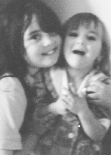
Two tiddas
Susie (27) and Alice (21) Anderson
S: What did it mean to you, when we were younger, that were Aboriginal?
A: Well, I dont ever really remember being sat down and told, Hey, Alice, guess what, youre Aboriginal. For some reason it was an unspoken understanding. It was as much of an understanding to me that I had ten fingers and ten toes or the fact that I only had one parent. I guess when youre a kid you just dont question the why so much. Things just are.
In primary school things were simpler. Not so much in my world around me, but in my mind at the time. Those were my glory days in terms of sport, and I wanted to be the next Cathy Freeman. Life was confusing, but in the way that it can be for kids.
Next pageFont size:
Interval:
Bookmark:
Similar books «Growing Up Aboriginal in Australia»
Look at similar books to Growing Up Aboriginal in Australia. We have selected literature similar in name and meaning in the hope of providing readers with more options to find new, interesting, not yet read works.
Discussion, reviews of the book Growing Up Aboriginal in Australia and just readers' own opinions. Leave your comments, write what you think about the work, its meaning or the main characters. Specify what exactly you liked and what you didn't like, and why you think so.

